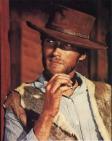THE WEST IS RED

For three weekends this month, the estimable Independent Film Channel focuses on “Spaghetti Westerns”, those 60s-era horse operas famed for their extreme violence, moral ambiguities, Spanish locations, thunderous musical scores and, above all, Lefty Italian directors with the Christian name of Sergio. Films like For a Few Dollars More (Sergio Leone’s sequel to his Fistful of Dollars, which made Clint Eastwood a star), Sergio Sollima’s The Big Gundown, The Great Silence, Sergio Corbucci’s classic drama of revenge and redemption, and the indefatigable The Good, The Bad, The Ugly, Leone’s grand finale in the Eastwood trilogy, are all being featured.
Shown, too, is a remarkable documentary Spaghetti West, which chronicles the work of writers like Franco Solinas, the devout Communist who wrote the screenplay for Gundown and the estimable A Bullet for the General, director Damiano Damiani’s anti-imperialist allegory of the Mexican Revolution. (Some may recall Solinas’ [uncredited] work on the much-maligned gem The Assassination of Leon Trotsky). Reds, in fact, were all over this genre, which produced hundreds of similar films (running the usual gamut of the good, the bad and the indifferent), and which revived for a time audiences’ love affair with the Western. Ennio Morricone, who wrote the music for the Eastwood trilogy and for countless other “spaghettis” as well as for other films, notably Henri Verneuil’s Guns for San Sabastian and the perfectly awful The Green Berets, John Wayne’s version of our Vietnam nightmare, and the actor Gian Maria Volonte, among many many others, were members of the Italian Communist party, an affiliation claimed at one time or another by most of their countrymen who were prominent in the arts of that period. (Morricone is still at work and is currently scoring the forthcoming epic Leningrad)
It was a remarkable if short-lived genre, combining what John Ford called “the most American of all art forms” with an often none-too-subtle critique of what America was doing in the world. In Vietnam. In Latin America. Everywhere. The wealthy cattle baron, the avaricious banker, the powerful and corrupt versus the poor but virtuous lent itself to this morality tale of American perfidy. Most of these films were not, even loosely speaking, “Marxist”; the heroes tended to be violent loners instead of the aroused masses of Marx or Lenin, but the message resonated in a world that was in thrall to the struggles of Vietnamese peasants, Chinese revolutionaries and French students.
Nor was the Spaghetti Western a great art form, either cinematically or in terms of influencing what came after; its sequel was a rapid degeneration in both Italian and American theatrical hands of a historic genre pioneered by the likes of William S Hart and Ford himself.
No, the Western, wheezing briefly back to life in the 1960s (American films like Hombre — itself directed by a former Communist — were an exception to the general rule of decline interrupted briefly by the “Italian West”) was already heading toward the Last Roundup, done in perhaps by history itself. The lone hero on horseback, prevailing against frightful odds to defeat a powerful and ruthless enemy, seemed increasingly out of place in a setting no longer recognizable in the mass civilization of the modern world.
He survives, perversely, largely in the imaginations of those whose values contravenes his in every conceivable way; in those who promote the George Bushes and the Ronald Reagans and the John McCains in an age longing for honest but resourceful heroes. But, increasingly and with diminishing hope, finding none.

Lone gunman
September 18, 2005 @ 11:02 am
You should check out Joss Whedon’s short-lived TV show “Firefly”, for a contemporary, science-fiction western revival with clear allusions to today’s corporate fascism.
Nicolas Alvarez
November 21, 2005 @ 12:43 am
I really liked this blog, really interesting to see someone who also knows much about spaghetti westerns, specifically Ennio Morricone. I collect a lot of his stuff. You should check out my blog, since I will probably be coming here a lot since im a marxist as well.
Louis Godena
November 21, 2005 @ 8:54 am
Thanks! I’ll do that! Not that American westerns didn’t have their share of Marxists and Marx-friendly cast and crew members. The very first Durango Kid movie (1940) had a fight scene in a cabin overlooked by a very large portrait of Karl Marx hanging over the fireplace!
Mario Nyman
February 9, 2006 @ 1:29 pm
Googling “corbucci site:harvard.edu” this blog was the only result I got. Sad, sad is your country. Mario from Europe.
Louis Godena
February 9, 2006 @ 2:58 pm
Thanks, Mario. We try.